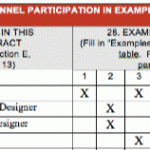
“If only I had,” is the most devastating phrase in the English language. We all carry some degree of regret in our hearts.
One of the most common traits I see in successful people is that they recognize and capitalize on opportunities. More importantly, they don’t shy away from opportunities that challenge their thinking or make them uncomfortable.
Trapped In Mediocrity
Most of us are trapped in mediocrity because of our fears and beliefs. My fears and beliefs held me in place as big opportunities passed me by.
Let me give you one example. In the summer before my senior year at college, I interned at the South Jersey Chamber of Commerce.
One day, the director of membership, a very connected individual who I rarely ever spoke to, came to my cubicle.
He asked me if I had a job lined up. “No,” I replied. I still had a year of college left.
This guy then did something completely unexpected. He picked up the phone on my desk and dialed a number. He told the person on the other end that he had a bright young man on the line who needed a marketing job. Then he handed that phone to me!
The voice on the other line said, “When can you start?”
What?!?!? I couldn’t believe it.
Then my beliefs and fears kicked in and started driving my internal narrative.
“This can’t be happening. I still have a year of school left! I can’t work like an adult if I don’t have a degree. I can’t accept a job I know nothing about on the spot like that! I’m not ready for this!”
I thanked the man on the other end of that call for the opportunity. I let him know I couldn’t take the job because I still had a year of school left.
When I hung up, the director of membership informed me that I was an idiot. I was going to college to get a job. He had just handed me a job!
Even if I felt I still needed that piece of paper, I could have easily transferred to a local college. And that employer would have probably paid for it.
He was right. But looking back, it wasn’t stupidity holding me back from making logical decisions. It was my illogical fears and misguided beliefs.
Since that day, I’ve seen this scenario play out over and over again. I’ve handed people job opportunities just to watch them pass. I’ve seen association chapters deny the gift of $5,000 worth of paperbacks, with no strings attached.
I’ve seen so many people faced with an opportunity make completely illogical decisions. These opportunities just don’t fit with “how things are done” and they can appear “too good to be true.”
In our minds, we are not supposed to be handed a job. People just don’t give out something of value without expecting anything in return. These scenarios just don’t match with what we’ve been taught.
But is this a logical response? It could be. I’m going to show you how to use these fears and beliefs to make great decisions.
How To Make Sure You Don’t Miss Out On Critical Opportunities (Or Fall Into Big Mistakes)
Opportunities are like fastballs. You’ve got to make good decisions about which to swing at. If you don’t swing when the ball is in front of you, the opportunity will pass you buy.
Here’s what to do when you are presented with something that might be an opportunity:
- Fold a piece of paper (landscape) in thirds.
- On the first third of the sheet, write down a list of everything that could go wrong (we’ll call this a risk) if you proceeded with this opportunity.
- Next to each item (in the second third), write down what you could do to reduce or eliminate the chances of the risk occurring.
- If there is nothing you can do to prevent or reduce the chances, write what you would do if it occurred, next to each item) in the final third of the paper.
- If you can’t think of any ways to reduce the possibility or address the risk once it occurs, just write “accept” in that final third.
- On a back side of the paper, write down the potential benefits of accepting this opportunity.
How To Decide Whether To Move Forward With An Opportunity
You’ve created a makeshift “risk register.” It’s actually a common tool many industries use to make important decisions and reduce the risk of failure.
You have identified the risks and how you’ll address them. But you’re probably left with a few that just say “accept.”
To make your decision, compare the list of benefits to the list of risks you must accept (i.e. you won’t be able to avoid or address).
Do the accepted risks outweigh the benefits?
If so, maybe the opportunity is too risky. If not, go for it. It’s that simple.
The Benefits Of Risk-Weighted Decision Making
This “Risk-Weighted Decision Framework” helps us make decisions by taking our illogical and irrational fears out of the picture. By identifying risks and addressing each one, we’re taking the emotion out of decision making.
The benefits include decisions based on logic that are more likely to succeed. They are more likely to succeed because you’ve already identified and planned for what could go wrong.
Once you use this framework to evaluate one or two decisions, you can run this exercise in your head for almost any decision you need to make.
Key Takeaway
Don’t miss out on great opportunities because of your fears or misguided beliefs. Instead, use my Risk-Weighted Decision Framework to look at the whole picture and make better decisions.
Now It’s Your Turn
Are there any decision frameworks or “rules of thumb” you’ve found helpful. Share with us in the comments.





[…] Are you letting opportunities pass you by? – one of the first signs of complacency is not taking advantage of new projects and or opportunities that make it onto your radar. New opportunities are important as they help build your existing skills set while potentially advancing your career. Passing on these will reduce your visibility in the company and let your skills go stale. […]